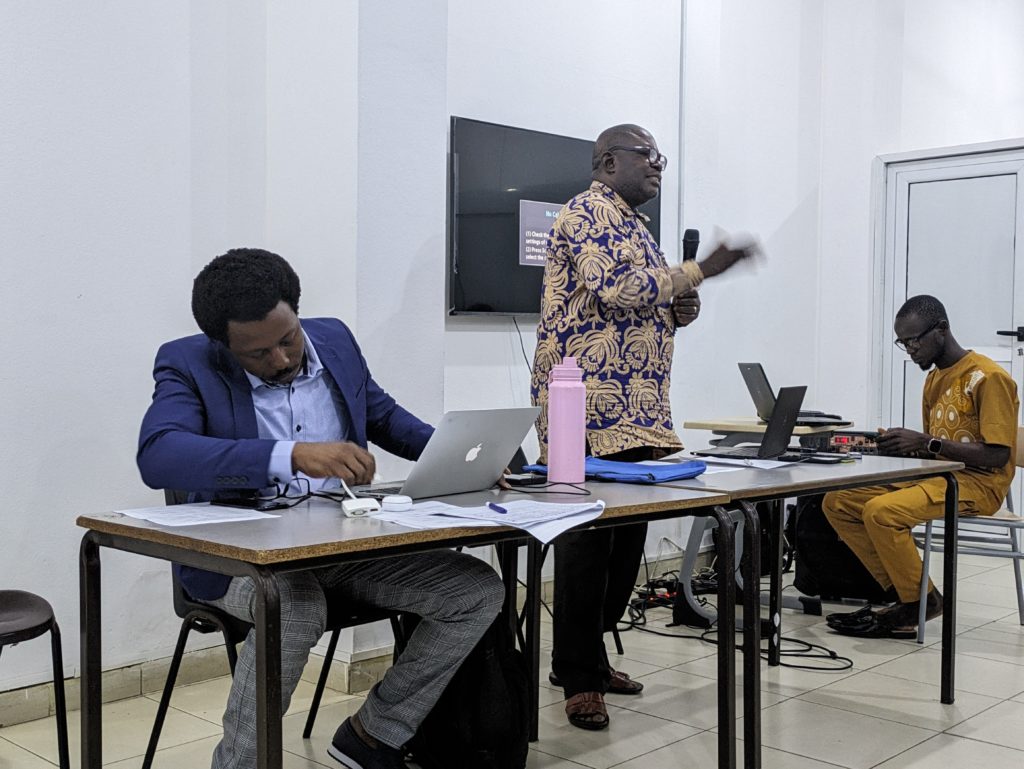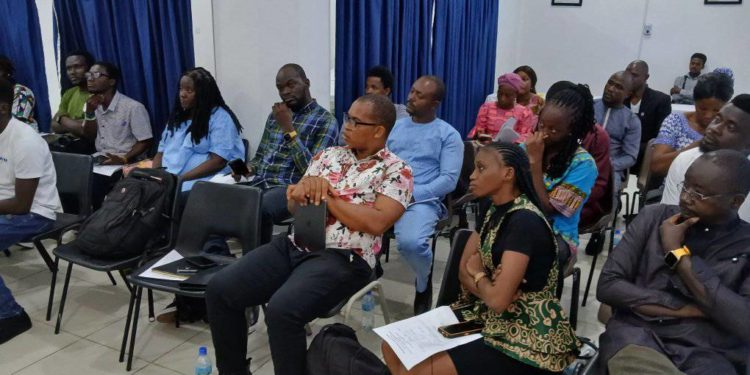By Kemo Cham
The Sierra Leonean Civil Society Organization Health Alert on Friday conducted a one-day training on reporting on health financing for journalists.
The training brought together 20 journalists from various media houses – print, electronic and online – across Freetown and its environs.
The organizers said the training was meant to capacitate journalists to report professionally on issues that have held back progress in the country’s health sector, which hinge on inadequate financing.
The training entailed a virtual session and several in-person presentations to the journalists, touching on the importance of building partnership, the significance of the recently launched National Public Health Agency (NPHA), and the role of domestic revenue mobilization in meeting health priorities.
Abuja based health finance campaigner, Dr Aminu Magashi Garba, took the journalists on the importance of building effective collaboration and partnership between civil society and the media on advocacy and health reporting. Dr Garba is the Founder and Chief Executive Officer of the African Health Budget Network (AHBN), which funded the training.
AHBN seeks to promote budget transparency and accountability for health on the continent.
Dr Garba told the participants via a video link from the Nigerian capital that collaboration with civil society is crucial for enhancing their advocacy for health financing.
“CSOs need to provide simple and straight forward messages to the media, without too much technicality and jargons, so that media can in turn inform the public appropriately,” he said. He also spoke about the importance for journalists to probe public officials and institutions to fulfill budgetary promises relating to the health, as well as the effectiveness of these health service providing institutions.
The training was conducted on the theme: “Role of media on health finance reporting for health security, emergency preparedness and response.”
Health Alert is a network of civil society and human rights advocacy group that advocates for and educate the masses on health issues and health care service delivery in Sierra Leone. The organization says it seeks to promote the interest and rights of vulnerable and marginalized categories of people especially women and children to access quality and affordable health care services and ensure their human rights are respected and protected.
Victor Lansana Koroma, Executive Director of Health Alert, said the objective of the training was to empower the media in reporting on health, especially as Sierra Leone is pushing for a health security agenda, following the establishment of the NPHA. Koroma said this is also part of efforts to build a partnership with the media for effective advocacy for adequate health financing.
“Journalists deliver the message to the people, and therefore we need to have common knowledge on how reporting is done, especially during emergencies,” the activist said.
“We want to build this partnership with the media, so that the media has knowledge on how to report,” he stressed.

Victor Lansana Koroma, Executive Director of Health Alert. Addresses the participants at the training on Friday, May 17, 2024. Photo credit, Kemo Cham, ManoReporters.
Koroma cited Sierra Leone’s failure to meet the African Union’s budget target for its member countries, which he said requires probing by the media.
Known as the Abuja Declaration, as agreed upon by heads of state and governments of the continental body in the Nigerian capital in 2001, the instrument calls for member states to prioritize investment in public health. It specifically requires governments to spend a minimum of 15 percent of its national budget on the health sector. It also requires countries to spend at least USD86 per capita on health.
Data show that the highest Sierra Leone has attained in terms of its annual budgetary allocation to the health sector is 11 percent.
But according to Koroma, as depressing as that might seem, the actually yearly disbursement is even more concerning. He said last year, for instance, available data show that only about 4 percent of the allocated fund was disbursed.
Other data have shown that the bulk of funds allocated to the Ministry of Health goes into the wage bill, leaving just a fraction for essential goods needed to provide quality healthcare services for the population.
Among many other issues, debt overhang remains a major obstacle for Sierra Leone to meets its budgetary priorities across the board, observes another healthcare campaigner, Musa Ansumana Soko, who presented on the significance of domestic revenue mobilization and accountability reporting. He said collaboration between the media and CSOs is essential to ensure that promises are fulfilled in governance.
Soko, who is Executive Director of the Water, Sanitation and Hygiene Network Sierra Leone, noted that 52 percent of the national budget goes to the wage bill, with 31 percent going to servicing debt, leaving only 17 percent for the rest of the country’s many problems.
“It means (that) it will now be a competition between debt financing and the real needs of the people,” he said.
According to the activist, Sierra Leone potentially has all it requires to finance its healthcare and other needs just from domestic sources. But this prospect, he noted, is frustrated by lack of the judicious use of the resources generated, much of which comes from donor funding.
“A balanced and objective media can improve on service delivery and reduces corruption,” Soko said.
Two other presentations meant to educate the participants on the role of the NPHA, as well as ethics in reporting on health security and emergency response, were delivered in person at the event convened in the conference hall of the Ramsy Building on Liverpool Street in Freetown.
Patrick Lansana, Risk Communication Officer in the Ministry of Health and the NPHA, said for the media to hold the agency accountable and collaborate with it, it must be au fait with the legal basis of its operations.
A presentation by a representative of the Health Reporters Network Sierra Leone focused on ethics in reporting on during health emergency.






















